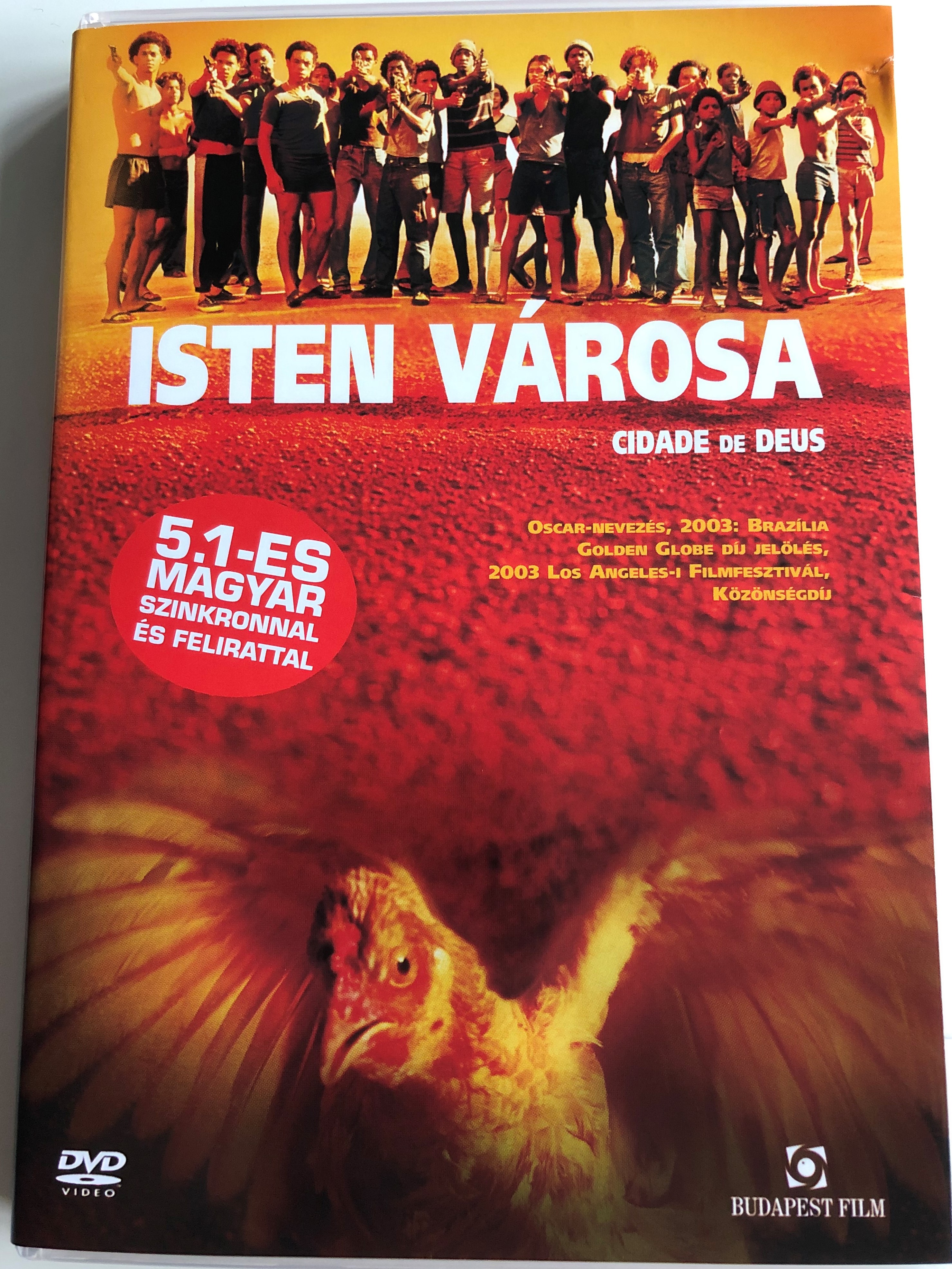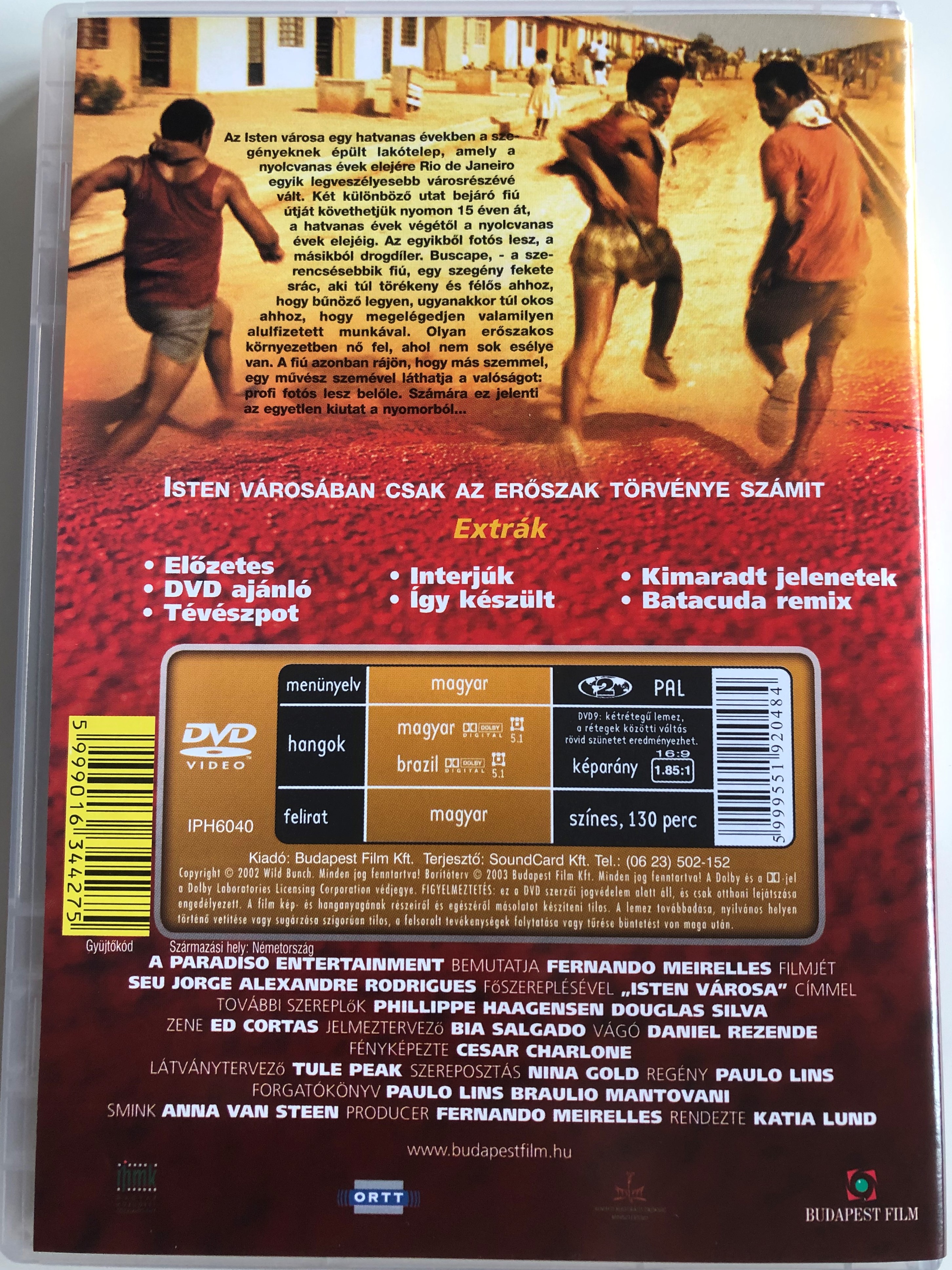Description
Cidade de Deus DVD 2002 Isten Városa (City of God) / Directed by Katia Lund / Starring: Seu Jorge, Alexandre Rodrigues, Douglas Silva
UPC 5999551920484 / 5999016344275
MADE IN EU
REGION 2 PAL DVD
Audio: Portuguese 5.1, Hungarian 5.1
Subtitle: Hungarian
Runtime: 130 minutes
English Summary:
City of God (Portuguese: Cidade de Deus) is a 2002 Brazilian crime film co-directed by Fernando Meirelles and Kátia Lund, released in its home country in 2002 and worldwide in 2003. The story was adapted by Bráulio Mantovani from the 1997 novel of the same name written by Paulo Lins, but the plot is loosely based on real events.
The film begins in medias res with an armed gang chasing after an escaped chicken in a favela called the Cidade de Deus ("City of God"). The chicken stops between the gang and the narrator, a young man nicknamed Rocket ("Buscapé").
The film flashes back to the 1960s where the favela is shown as a newly built housing project with little resources. Three impoverished, amateur thieves known as the "Tender Trio" – Shaggy ("Cabeleira"), Clipper ("Alicate"), and Rocket's older brother, Goose ("Marreco") – rob business owners and share the money with the community who, in turn, hide them from the police. Li'l Dice (Dadinho), a young boy, convinces them to hold up a motel and rob its occupants. The gang resolves not to kill anyone and tells Li'l Dice to serve as a lookout. Instead, Li'l Dice guns down the motel occupants after falsely warning the trio that the police are coming. The massacre is brought to the police's attention, forcing the trio to split up: Clipper joins the church, Shaggy is shot by the police while trying to escape the favela, and Goose is shot by Li'l Dice after taking his money while Li'l Dice's friend Benny (Bené), Shaggy's brother, watches.
Portuguese Summary:
Na cena de abertura, galinhas são preparadas para o almoço quando uma escapa e é perseguida por um grupo armado pelas ruas da favela Cidade de Deus. A galinha pára entre a gangue e um jovem chamado Buscapé, que acredita que a gangue quer matá-lo. Buscapé, o narrador, começa a contar a história de sua infância, e o filme volta ao final dos anos 1960.
Nos anos 1960, a favela é um complexo habitacional recém-construído longe do centro do Rio de Janeiro, com pouco acesso à eletricidade e água. Três ladrões amadores conhecido como "Trio Ternura" — Cabeleira, Alicate e Marreco — aterrorizam os negócios locais. Marreco é o irmão de Buscapé. Como Robin Hood, eles dividem parte do dinheiro roubado com os habitantes da favela chamada de Cidade de Deus e, em troca, são protegidos por eles. Vários garotos acompanham e idolatram o trio, e, um deles, chamado de Dadinho, os convence a roubar um motel. A gangue concorda, porém, decidem por não matar ninguém e, achando que Dadinho é pequeno demais para participar, deixam ele como vigia. Insatisfeito, Dadinho dá um tiro de advertência no meio do roubo e procede para satisfazer seu desejo assassinando todos ocupantes no motel. O massacre chama a atenção da polícia, fazendo com que o Trio Ternura deixe a favela. Alicate se junta à igreja, Cabeleira é morto pela polícia ao tentar escapar com sua namorada e Marreco é morto por Dadinho depois de tentar roubar o dinheiro do menino e seu amigo Bené, que estavam se escondendo após os crimes cometidos no motel.
Hungarian Summary:
A film Rio de Janeiro nyomornegyedének szegények lakta utcáin zajlik. Két különböző utat bejáró fiú útját követi nyomon 15 éven át, a hatvanas évek végétől a nyolcvanas évek elejéig. Az egyikből fotós lesz, a másikból drogdíler. A film rövid történetek sorozatán keresztül mutatja be életútjukat, melyekből sokszor igen rövidre sikeredett sorsok rajzolódnak ki. Az Isten városa főszereplője nem egy személy, hanem egy hely. Az Isten városa egy hatvanas években elkezdett, szegényeknek épült lakótelep, amely a nyolcvanas évek elejére Rio de Janeiro egyik legveszélyesebb városrészévé vált. A hely történetét a film jónéhány szereplő sztoriján keresztül meséli el. Ám mindent a narrátor nézőpontjából látunk: Buscape egy szegény fekete srác, aki túl törékeny és félős ahhoz, hogy bűnöző legyen, ugyanakkor túl okos ahhoz, hogy megelégedjen valamilyen alulfizetett munkával. Olyan erőszakos környezetben nő fel, ahol nem sok esélye van. A fiú azonban rájön, hogy más szemmel, egy művész szemével láthatja a valóságot: profi fotós lesz belőle. Számára ez jelenti a megváltást...
Cast / Szereplők:
| Name | Actor(s) | Name in English subtitles | Description |
|---|---|---|---|
| Buscapé ("Firecracker") | Alexandre Rodrigues (adult) Luis Otávio (child) |
Rocket | The main narrator. A quiet, honest boy who dreams of becoming a photographer, and the only character who manages to prevent himself from being dragged down into corruption and murder during the gang wars. His real name is Wilson Rodrigues. |
| Zé Pequeno ("Little Joe" "Lil Zé") childhood: Dadinho ("Little Eddy" "Lil Dice") |
Leandro Firmino da Hora (adult) Douglas Silva (child) |
Li'l Zé Li'l Dice |
A power-hungry, sociopathic drug lord who takes sadistic pleasure in killing his rivals. When his only friend, Benny, is killed, he is driven over the edge. "Dado" is a common nickname for Eduardo, and "inho" a diminutive suffix; "dado" also means "dice". As an adult, he changes his name to Zé Pequeno in Candomblé ceremony, a religion of African origin. Since it was chosen for him at that moment, it may be unrelated to his actual name. Zé is a nickname for José, while pequeno means "little". |
| Bené ("Benny") | Phellipe Haagensen (adult) Michel de Souza Gomes (child) |
Benny | Zé's longtime partner in crime, he is a friendly City of God drug dealer who fancies himself a sort of Robin Hood, and eventually wants to lead an honest life. |
| Sandro, nicknamed Cenoura ("Carrot") | Matheus Nachtergaele | Carrot | A smaller-scale drug dealer who is friendly with Benny but is constantly threatened by Zé. |
| Mané Galinha ("Chicken Manny") | Seu Jorge | Knockout Ned | A handsome, charismatic ladies' man. Zé rapes Ned's girlfriend and then proceeds to kill several members of Ned's family. Ned joins forces with Carrot to retaliate against Zé. His name was changed for the English subtitles because in English, "chicken" is a term for a coward (in Brazil it denotes popularity among women). "Mané" is a nickname for Manuel. |
| Cabeleira ("Long Hair") | Jonathan Haagensen | Shaggy | Older brother of Bené ("Benny") and the leader of the Tender Trio ("Trio Ternura"), a group of thieves who share their profits with the population of the City of God. |
| Marreco ("Garganey") | Renato de Souza | Goose | One of the Tender Trio, and Rocket's brother. |
| Alicate ("Pliers") | Jefechander Suplino | Clipper | One of the Tender Trio. Later gives up crime and joins the church. |
| Barbantinho ("Little twine") | Edson Oliveira (adult) Emerson Gomes (child) |
Stringy | Childhood friend of Rocket. |
| Angélica | Alice Braga | Angélica | A friend and love interest of Rocket, and later Benny's girlfriend, who motivates Benny to abandon the criminal life. |
| Tiago | Daniel Zettel | Tiago | Angélica's boyfriend, who later becomes Li'l Zé's associate and a drug addict. |
| Filé com Fritas ("Steak with Fries") | Darlan Cunha | Steak with Fries | A young boy who joins Zé's gang. |
| Charles, nicknamed Tio Sam ("Uncle Sam") | Charles Paraventi | Charles / Uncle Sam | A weapons dealer. |
| Marina Cintra | Graziella Moretto | Marina Cintra | A journalist for Jornal do Brasil, who hires Rocket as a photographer. Rocket has his first sexual experience with her. |
| Touro ("Bull") | Luiz Carlos Ribeiro Seixas | Touro | An honest police officer. |
| Cabeção ("Big Head") | Maurício Marques | Melonhead | A corrupt police officer. |
| Lampião ("Lantern") | Thiago Martins | Lampião | Child leader of the Runts gang. |
| Otávio | Marcos Junqueira | Otávio | Child leader of the Runts gang. |
| Portuguese | Cidade de Deus |
|---|---|
| Directed by |
|
| Produced by |
|
| Screenplay by | Bráulio Mantovani |
| Based on | City of God by Paulo Lins |
| Starring |
|
| Music by |
|
| Cinematography | César Charlone |
| Edited by | Daniel Rezende |
|
Production
company |
|
| Distributed by | Miramax Films |
|
Release date
|
|
|
Running time
|
130 minutes |
| Country | Brazil |
| Language | Portuguese |























